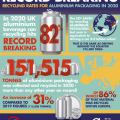Experts and activists reported that the Polish government will face millions of dollars in fines from the European Union if it does not soon introduce a previously promised system for recycling packaging. This would be truly unfortunate as it would mean billions in expenses.
The Ministry of Climate announced in June last year that, by 2023, there would be a new law that would give citizens the opportunity to return glass or plastic bottles and aluminum cans without the need to present the purchase receipt.
The Polish government has adopted such a measure to help meet the European Union’s recycling targets. This guideline requires member countries to ensure, in the coming years, separation of at least 77% of all single-use plastics by 2025 and 90% by 2029.
Despite the Polish government’s intention to implement a deposit system, the legislative documents that would make it possible have not yet been submitted and approved. According to Dziennik Gazeta Prawna, the process will be delayed by at least a year and a half, as Anna Moskwa, the Minister of Climate, confirmed.
In the current context, the legislation expected to be approved by the current parliament will not be ready for implementation until January 2026.
According to Piotr Wołejko of the Federation of Polish Entrepreneurs, if the deposit-refund system is not implemented by the Polish authorities during the current legislature and it turns out that it comes into force only until 2030, it would mean huge economic losses for the state budget and would also affect businesses and consumers; there is talk of some five billion zloty lost unnecessarily.
If this measure is not adopted soon, it would cause serious pollution problems in a country whose air is one of the worst in Europe. The Polish Zero Waste Association has launched a new campaign to encourage the government to introduce the deposit system, which it says would increase recycling rates from around 50% to 90%.
The development of municipal policies on waste recovery is crucial as the target set for 2030 for the complete and progressive elimination of non-recyclable plastics adopted in the 2018 Plastics Strategy, the limitation in the production of batteries and accumulators due to their polluting effect, or the creation of a protocol for construction and demolition waste, as they represent 30% of all waste generated in Europe.














